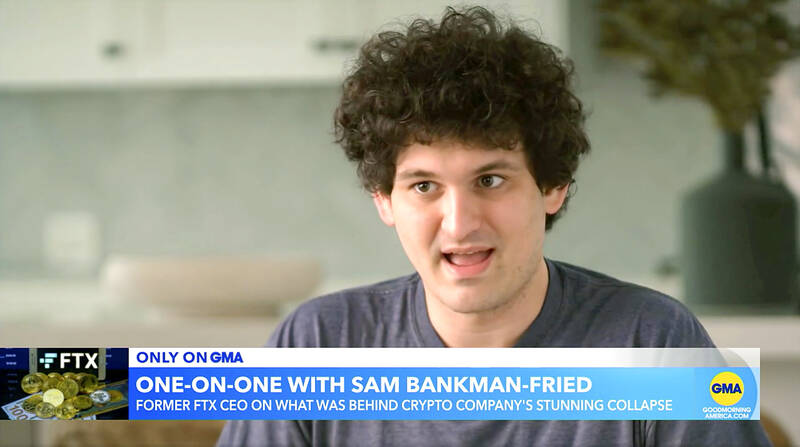In the past few weeks a photograph of Tony Blair and his buddy Bill Clinton sharing a panel with a scruffy kid wearing a T-shirt, baggy shorts and trainers has been doing the rounds. The April event was in the Bahamas and funded by an outfit called FTX — a supposedly “user-friendly crypto exchange”—– owned by the scruffy kid, Sam Bankman-Fried (SBF from now on). Blair and Clinton are looking very pleased to be there, providing confirmation of the aphrodisiac effect of great wealth, because the lad who was playing host was apparently as rich as Croesus, or at any rate worth US$32 billion.
And this was real wealth, it seemed. After all, the venture capitalists at Sequoia — who had backed Silicon Valley success stories such as Google and PayPal — had given him the green light (as well as some of their investors’ money). A few months after Blair and Clinton made their pilgrimage to the sun-soaked and regulation-lite Bahamas, one of Sequoia’s partners offered a breathless endorsement of SBF and his crypto exchange.
“Of the exchanges that we had met and looked at,” she wrote, “some of them had regulatory issues, some of them were already public. And then there was Sam.” And FTX, which, Sequoia felt, was “Goldilocks-perfect.”

Photo: AP
And then, suddenly, it wasn’t. In fact it was effectively bankrupt. And it had been managed, said the administrator brought in to sort out the mess, using fraternity-house accounting principles, which kind-of squared with SBF’s sartorial style. The thousands of get-rich-quick schmucks who had invested their savings on various FTX exchanges, however, were not impressed and may even now be having to pawn their handmade suits.
All of which is par for the course for the crypto racket, except for two things. The first is that SBF is a proclaimed effective altruist, ie a believer that the most important moral imperative is to make shedloads of money in order that one can give it away to do good.
The second is that he is a confirmed subscriber to “longtermism” — the idea that the far future should be given at least as much weight as the present in moral and political decision-making. This year alone he had, according to the Economist, funneled more than US$130 million into the movement via the FTX Future Fund, a non-profit organization that provides grants to projects aiming to secure humanity’s long-term future.

Photo: Reuters
This strange convergence of a philosophy of philanthropic giving with a concern about existential risk to humanity’s future is intriguing. The philosophical roots go back to Peter Singer, an Australian moral philosopher who teaches at Princeton and now describes himself as a “hedonistic utilitarian.” He is famous for (among many other things) a 1972 essay, “Famine, Affluence and Morality,” in which he argued that affluent people are morally obliged to donate far more resources to humanitarian causes than is considered normal in western cultures.
Singer’s article had a life-changing impact on William MacAskill, a philosophy student at Cambridge and, as a New Yorker profile of him puts it, shunted him “on to a track of rigorous and uncompromising moralism” — which, translated, means very challenging to live with.
As a postgraduate student at Oxford he gave away most of his stipend, lived very frugally and started a moral crusade called “effective altruism” (EA), the idea that people ought to do good in the most clear-sighted, ambitious, and unsentimental way possible. So, for example, if you’re a young well-intentioned graduate wondering whether to take a job working for a charity or become a trainee in an investment bank, then the latter is the effective altruistic way of doing good, because in the end you will have far more loot to distribute.

Photo: AP
There are various ways of looking at this. At one level, it could just be conscience-salving ethics-washing: making one feel good while earning colossal amounts of money financing the burning of the planet. But at a deeper level there’s a hard-headed edge to it. Instead of having to be cruel to be kind you need to be rational to maximize the benefits of your charity. That, presumably, is what motivated some young hedge fund guys at Bridgewater to set up GiveWell, a nonprofit group that tries to identify the most effective giving opportunities using hard data rather than emotions or moral sentiment.
“We search,” says their Web site, “for the charities that save or improve lives the most per dollar.”
If you wanted a posh term for this mindset you’d say it was an offshoot of utilitarianism called consequentialism — charity based not on explicitly moral principles, but on pragmatic assessments of the consequences of a gift. What will do the greatest good for the greatest number?
And this, it turned out, was catnip to the current crop of young tech billionaires who have become obscenely rich while still in their 30s or 40s and love to flaunt their credentials as super-rational technocrats. These are folks who don’t necessarily want to have their names on boring old university buildings or make donations to established foundations and art galleries. Instead they want to be involved in some way and to see their money getting results and making a measurable impact. Nerds with hearts, you could say.
Not surprisingly, MacAskill’s little crusade started attracting serious money from them — maybe amounting, some think, to more than US$30 billion. Dustin Muskovitz was an early supporter. He was a co-founder of Facebook and an early contributor to EA, finding that MacAskill’s philosophy aligned nicely with Open Philanthropy, the foundation he set up with his wife to specialize in “strategic cause selection.” As Silicon Valley money poured in, so too did the tech industry’s engineering mindset, obsessed as it is with two things: efficiency and optimization. But with them also came the valley’s obsession with humanity’s long-term future, whether it be on Earth, Mars or some other extraterrestrial location.
At this point, two questions come to mind. First, what exactly has this guy been smoking? And secondly, what’s driving this focus on the infinitely-longterm future at the expense of more immediate and soluble problems? Whose interests are being served here? MacAskill has become the poster child for something; but what is it? Without us noticing it, longtermism has become a well-funded movement.
If a coherent movement is indeed being constructed round this longtermist philosophy, then one reason for taking it seriously is that we have been here before — in what Philip Mirowski christened the “neoliberal thought collective.” When Hayek, Von Mises and co embarked on their project to realign the world along market-friendly lines, they were regarded as continental cranks. And now their ideas rule the democratic world. Keynes was wrong: in the long run we are not all dead.

Growing up in a rural, religious community in western Canada, Kyle McCarthy loved hockey, but once he came out at 19, he quit, convinced being openly gay and an active player was untenable. So the 32-year-old says he is “very surprised” by the runaway success of Heated Rivalry, a Canadian-made series about the romance between two closeted gay players in a sport that has historically made gay men feel unwelcome. Ben Baby, the 43-year-old commissioner of the Toronto Gay Hockey Association (TGHA), calls the success of the show — which has catapulted its young lead actors to stardom -- “shocking,” and says

The 2018 nine-in-one local elections were a wild ride that no one saw coming. Entering that year, the Chinese Nationalist Party (KMT) was demoralized and in disarray — and fearing an existential crisis. By the end of the year, the party was riding high and swept most of the country in a landslide, including toppling the Democratic Progressive Party (DPP) in their Kaohsiung stronghold. Could something like that happen again on the DPP side in this year’s nine-in-one elections? The short answer is not exactly; the conditions were very specific. However, it does illustrate how swiftly every assumption early in an

Inside an ordinary-looking townhouse on a narrow road in central Kaohsiung, Tsai A-li (蔡阿李) raised her three children alone for 15 years. As far as the children knew, their father was away working in the US. They were kept in the dark for as long as possible by their mother, for the truth was perhaps too sad and unjust for their young minds to bear. The family home of White Terror victim Ko Chi-hua (柯旗化) is now open to the public. Admission is free and it is just a short walk from the Kaohsiung train station. Walk two blocks south along Jhongshan

Francis William White, an Englishman who late in the 1860s served as Commissioner of the Imperial Customs Service in Tainan, published the tale of a jaunt he took one winter in 1868: A visit to the interior of south Formosa (1870). White’s journey took him into the mountains, where he mused on the difficult terrain and the ease with which his little group could be ambushed in the crags and dense vegetation. At one point he stays at the house of a local near a stream on the border of indigenous territory: “Their matchlocks, which were kept in excellent order,